
Today we’re talking about techniques to control overthinking. And to say I’ve got some experience with overthinking might be an understatement.
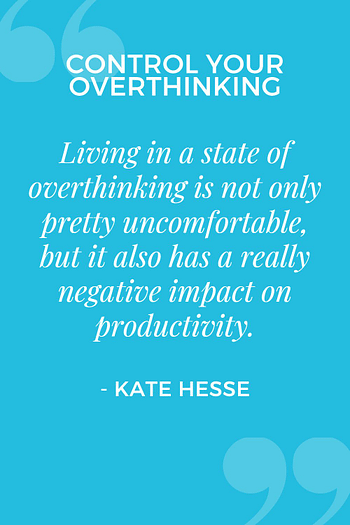 Here are just a few examples. . .
Here are just a few examples. . .
I once spent 30 minutes trying to pick between two nearly identical sheets of paper when selecting new letterhead stock.
I’ve had emails sit in my draft box for hours because I couldn’t decide how to word a particular sentence or how to sign it.
Oh, and I have the ability to take one thing I’ve said or done and decided it’s ended a friendship only to talk to that friend a few days later and realize they were never even a little upset with me.
Living in a state of overthinking is not only pretty uncomfortable, it also has a really negative impact on productivity, so I’ve learned a bunch of tools and techniques I’m excited to share with you to help you begin to reign in your overthinking too!
Intuition is the antidote to overthinking
The tool I turn to most often now in stopping my mind when it gets on the hamster wheel of overthinking is tapping into my intuition. I covered the science behind your intuition in Episode 7 of the podcast, if you want to get deep into how it works.
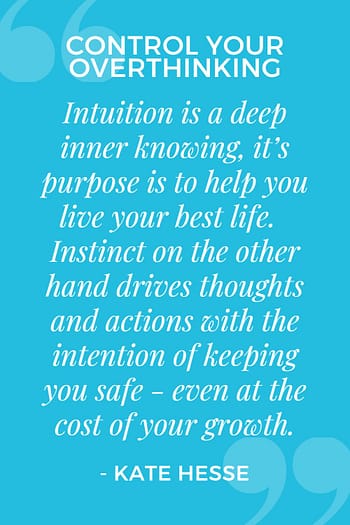 Intuition vs. instinct
Intuition vs. instinct
Let’s take a moment and distinguish between intuition and instinct. Intuition is a deep inner knowing, it’s purpose is to help you live your best life.
Instinct is driven by your amygdala – the fear center in your brain. It drives thoughts and actions with the intention of keeping you safe.
And when you’re in actual danger, your instinct is great, but when you’re trying to decide what paper to choose or worried about what someone is thinking about what you just said or did, it isn’t quite as helpful.
Fear serves an important role in our lives – when we’re facing actual danger, it gets our bodies and minds working together to take action to best ensure our survival.
But your brain and body don’t differentiate between stressors – they don’t identify a difference between being late for work and standing in front of a hungry lion.
So when you’re caught in a loop of overthinking, often it’s being fueled by fear stories. Which is when we need to provide our instincts with a little supervision by inviting our intuition to chime in.
Intuition can get you unstuck
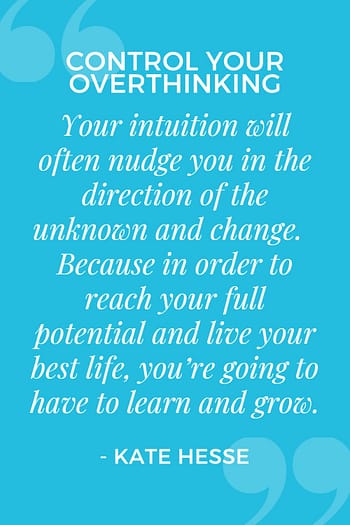 Your intuition in contrast to your instinct isn’t driven by an agenda to keep you safe at all costs. Rather, it’s seeking to help you realize your full potential. Your instinct identifies both change and the unknown as potential threats, and so it often acts to keep you stagnant.
Your intuition in contrast to your instinct isn’t driven by an agenda to keep you safe at all costs. Rather, it’s seeking to help you realize your full potential. Your instinct identifies both change and the unknown as potential threats, and so it often acts to keep you stagnant.
Your intuition on the other hand will often nudge you in the direction of the unknown and change. Because in order to reach your full potential and live your best life, you’re going to have to learn and grow.
Using intuition to stop overthinking
Having said all that – let’s get back to today’s question. How can you use intuition to help you stop overthinking?
I do an intuition check hundreds of times a day. Remember the thirty minutes I spent flip-flopping on what paper to choose? I make those types of decisions now in a matter of seconds. I quickly check in with my intuition, and I’ve learned to trust the advice it offers.
The same applies to what clothes to wear, how to close the email, where to go for dinner, what to order off the menu, and the countless other minor decisions that would once be prime candidates for my overthinking.
Using your intuition to control overthinking requires two parts – first you need to learn how to communicate with your intuition in a quick and clear manner, and second, you need to develop a trust in your intuition.
It doesn’t matter how many messages you get from your intuition, if you don’t trust it, you’re right back in the overthinking loop you started with.
If this is resonating with you but you’re not sure where to start, check out my Intuition 101 course with everything you need to learn how to tap into and build trust in your intuition. And remember – podcast listeners save 25% with code PODCAST.
Putting it in perspective
If you find your overthinking tends to run more along the lines of worst case scenario and catastrophizing, then getting bogged down in the weeds of minor decisions, here are a few more tools to help you break out of that mental loop.
A 2020 study published in Nature Communications found we have over 6,000 thoughts a day. This study used fMRI data to observe brain activity and trace thoughts. Assuming you sleep between seven and eight hours a night, that leaves you with between five and six thoughts a minute. How many of those thoughts are you actually consciously paying attention to?
Quick side-note fun fact, you might have seen 70,000 as the number of thoughts we have each day, it’s been cited all over the internet, but I, as well as others who have written on this topic, can’t actually find any research to back up this number. And while the 2020 study I just referenced did find some personality characteristics caused people to jump from thought to thought with more frequency than others, until additional research is done, I’d rather err on the side of caution and stick with the 6,000 thoughts per day number.
Ok, off my “just because the internet says it doesn’t means it’s true” soapbox. The first step in breaking the overthinking loop is paying attention to your thoughts so you can recognize when you start overthinking. If you often find you’ve been circling around the same thought for a while before you finally notice it, here are a few suggestions to get you started noticing it faster.
Noticing your thoughts
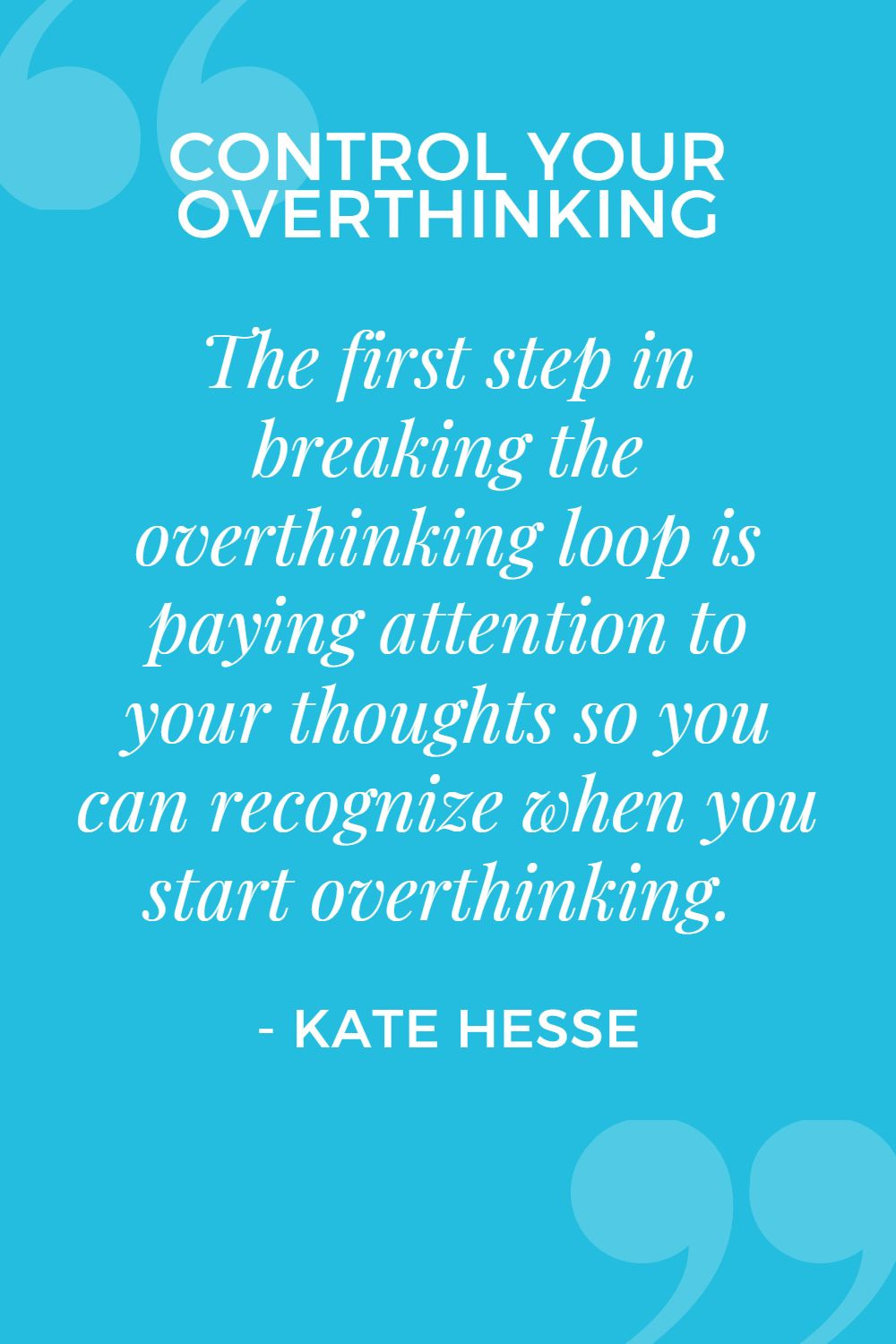 Simply set the intention – ask your mind to let you know when it begins to overthink. Try waking up each morning and saying – either aloud or in your head – “I will notice as soon as I start to overthink today”. Maybe write it on a post-it and put it somewhere you can see it, or try adding it as a graphic on your lock screen on your phone or computer.
Simply set the intention – ask your mind to let you know when it begins to overthink. Try waking up each morning and saying – either aloud or in your head – “I will notice as soon as I start to overthink today”. Maybe write it on a post-it and put it somewhere you can see it, or try adding it as a graphic on your lock screen on your phone or computer.
Change the wording to what works for you – instead of overthinking, you might use catastrophizing, obsessing, or getting stuck.
Once you notice you’ve dropped into this pattern of thinking, thank you brain for bringing it to your attention – this reinforces the process of notifying you as it happens. If you launch into self-criticism, you instead make letting you know you’re overthinking become something unwanted – which then triggers your instinct to try and keep you from noticing for longer by distracting your attention with something else.
This may sound a little woo-woo, but think about it for a second. If you yelled at a kid for spilling juice on the carpet, do you think they’d come and tell you the next time they spilled, or would they be more likely to put a pillow over it and act surprised when you found the spill? Your brain works the same way. If it thinks something is unwanted it will do it’s best to hide it from you.
A super simple internal script you could try when you notice yourself overthinking is – “thanks for bringing this to my attention”.
Break overthinking cycles by asking yourself a few questions
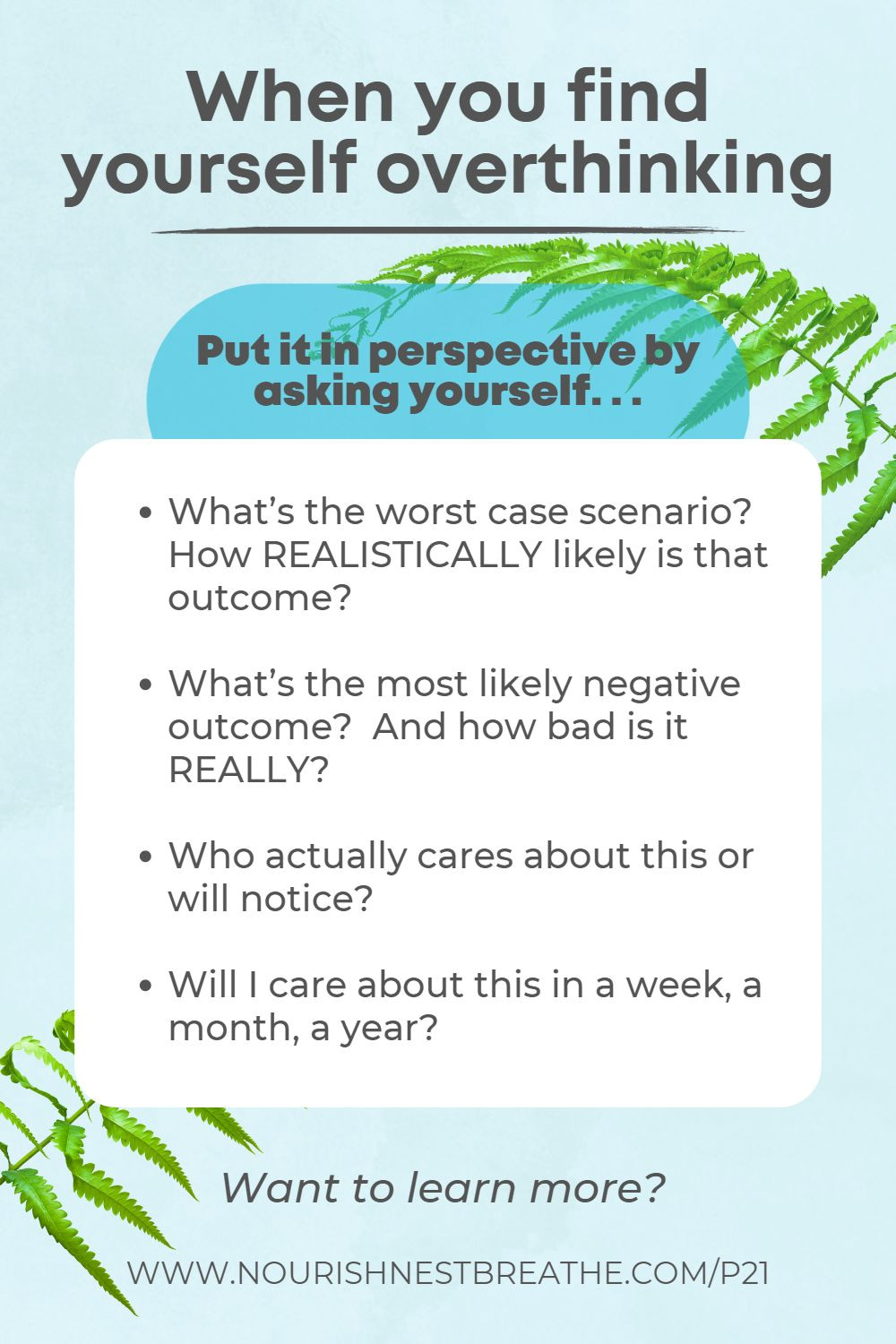
Once you’ve noticed you’ve slipped into an overthinking cycle, here are a few question to ask yourself to help bring some perspective to the situation.
- What’s the worst case scenario? How REALISTICALLY likely is that outcome?
- What’s the most likely negative outcome? And how bad is it REALLY?
- Who actually cares about this or will notice? and
- Will I care about this in a week, a month, a year?
Using these questions to create perspective
Our mind tries to protect us by coming up with worst case scenarios in an attempt to “prepare” us. But let’s put the reality of that worst case scenario happening in a little perspective.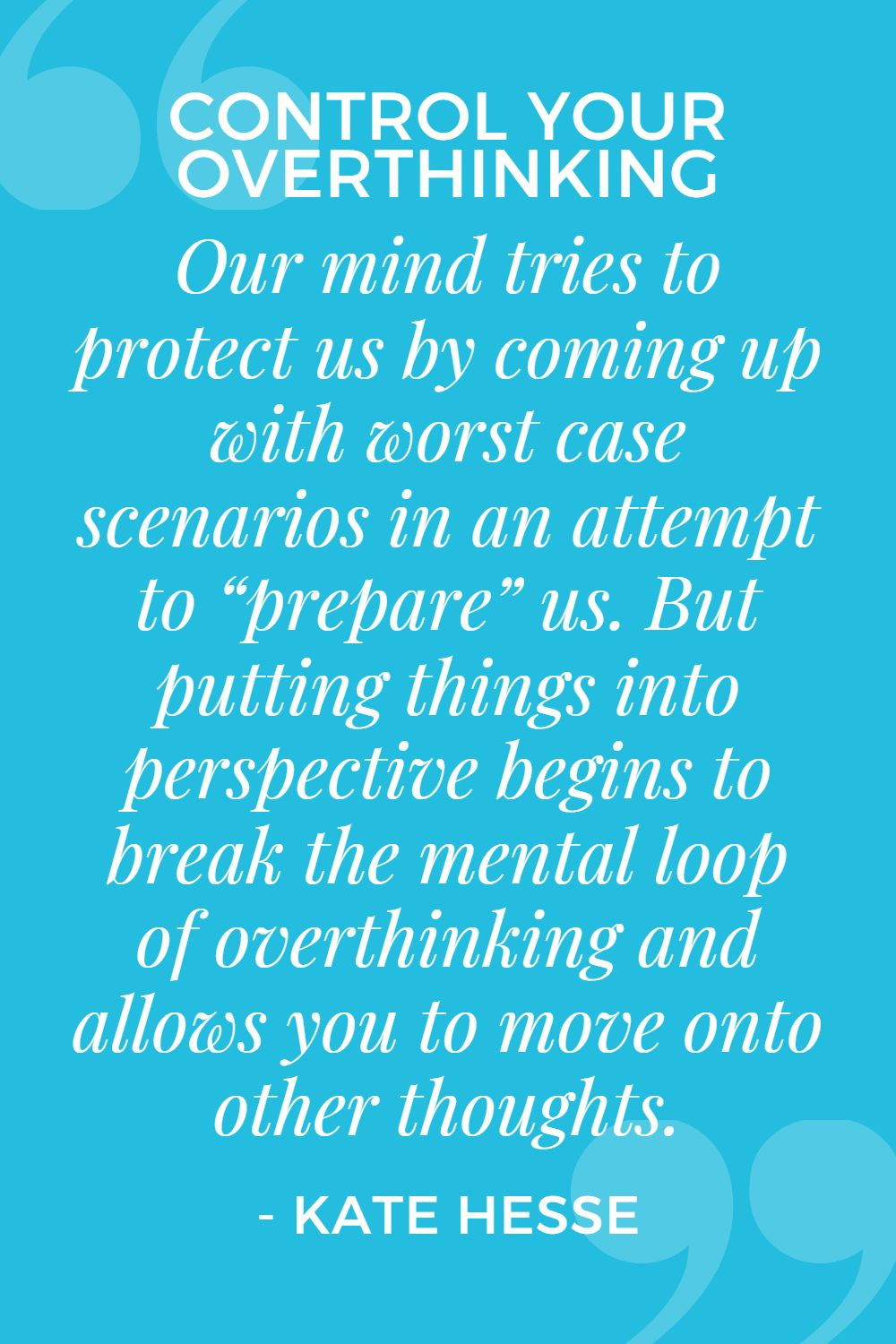
Imagine you’re worried about where to go for dinner. Worst case scenario is the restaurant you pick ends up giving you food poisoning and you end up sick and miss an important meeting at work the next day.
Now think about how many times you’ve eaten out, and how often you’ve actually gotten food poisoning.
The most likely negative outcome is probably that you’ll get a meal you don’t totally enjoy and will be a little disappointed in your dinner.
And will you really still be thinking about that meal in a week, month, or a year? Will that disappointing meal be one of the things you think about at the end of your life?
As you begin to put the topic you’re overthinking into perspective, it begins to break the mental loop and allow you to move onto other thoughts.
Build this habit to reduce overthinking
Just like with many of the tools and techniques I cover, this is a muscle that will become stronger with repetitive use. While it might feel like a struggle the first several times you notice your overthinking, the more you use this technique the more it will become habit and the easier it will be.
Use it often enough, and you’ll find this process becomes the autopilot instead of the overthinking!
Mindfulness practices stop overthinking
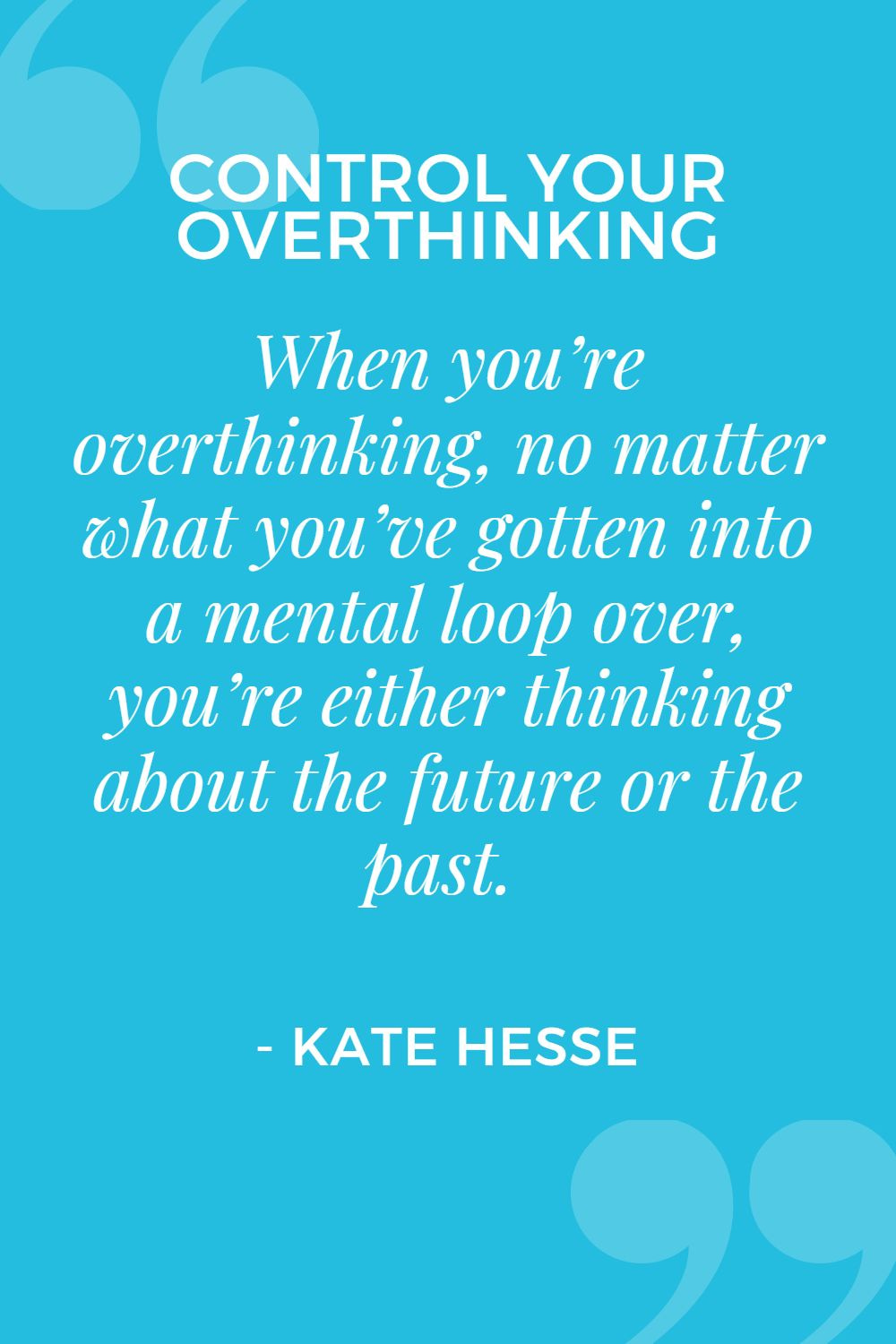 When you’re overthinking, no matter what you’ve gotten into a mental loop over, you’re either thinking about the future or the past.
When you’re overthinking, no matter what you’ve gotten into a mental loop over, you’re either thinking about the future or the past.
Think about some of the things you tend to overthink. Even if it’s about a decision in the present moment, the overthinking is fueled by thoughts of how that decision will impact your future.
We can also get stuck in loops of rumination about something we said or did (or didn’t say or do) in the past. And we combine the two and worry about how something that happened in the past will impact something in the future!
And because your overthinking is tied into this temporal dislocation, bringing your mind back to the present moment is a powerful tool in stopping your overthinking loop.
How mindfulness works
Mindfulness is a tool which brings your attention fully into the present moment by bringing your focus to what you’re experiencing in the here and now. There are so many different mindfulness techniques, but I’ve got three mindfulness tools I love to quickly and easily bring you back to the present moment. The next time you find yourself caught up in a pattern of overthinking, take a few moments and practice one of these techniques:
The first is the mindful moment – we went into detail on this technique in Episode 11.
The second is the audible exhale – I guided you through this practice in Episode 8.
And the third is to use a grounding technique that works for you – I covered grounding techniques in Episode 14 – the grounding into your feet visualization I shared in that episode would be a great one to use if you’re struggling with overthinking.
Because we’ve covered these in past episodes I won’t go into detail on them here, but get more details and links to each technique in this week’s worksheet – get your copy using the form below.
Putting it all together – to control your overthinking
While any one of these techniques would be incredibly helpful in and of itself, using them all together can help you really shift out of overthinking so you can reclaim time and gain more ease in all aspects of your life!
But because you know I believe that small steps are the key to making lasting change, pick the one tool or technique that resonates most strongly with you right now. If none of them are especially calling out to you, pick the technique that seems easiest to implement in your daily life. Work with that tool or technique until it becomes habit before turning your attention to adding another one to your toolkit.
If you’re ready to start stepping off the hamster wheel of overthinking, grab this week’s worksheet using the form below! I’ve included resources for all of the tools and techniques covered in this post. Get started connecting with and trusting your intuition, get the questions and sample script to bring your awareness to your thoughts and shift your perspective, and learn how to get started using the mindfulness tools I mentioned.
And remember – living your best life isn’t about changing your life – it’s about changing the way you show up for your life!
Show Notes
Additional Resources
Don’t forget to download this weeks worksheet with more information on all of the tools and techniques I covered today using the form below.
Mentioned in this Episode
The science behind your intuition
Intuition 101 learn more and register – don’t forget to save 25% when you register with code PODCAST
The Mindful Moment
The Audible Exhale
Discover Grounding Techniques
Schedule a Breakthrough Discovery Session.
Get on the VIP list to have all podcast worksheets delivered to your inbox each Tuesday morning.
Submit your question to be featured on a future episode.
Related
One thought on “Sanity-saving tools to stop your overthinking”
Leave a Reply Cancel reply
This site uses Akismet to reduce spam. Learn how your comment data is processed.
[…] example, in Episode 21 of Solicited Advice to Live Your Best Life, we talked about techniques to control […]